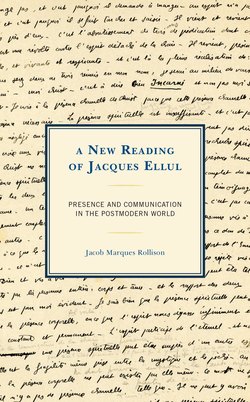Читать книгу A New Reading of Jacques Ellul - Jacob Marques Rollison - Страница 14
На сайте Литреса книга снята с продажи.
Ellul in Crisis
ОглавлениеBeyond elucidating how presence and dialectic shift over time in Ellul’s work, this book also highlights an unexplored element of Ellul’s life: his personal wrestling with structuralist approaches to language. My reading unearths a clear admission of personal crisis. An examination of this crisis exposes a more finely-grained account of Ellul’s theological transition. Ellul opens his 1972 L’Espérance oubliée (literally, Forgotten Hope; translated as Hope in Time of Abandonment, 1973) by recounting having passed through “. . . a severe trial by which everything, once more, was put in question. And not only in my most personal affections, or in the meaning of what I could attempt to undertake, but also in what has constituted the center of my person—or at least what I believe, which constitutes the center of my person, this faith so indisputable and that I experience as so fragile.”[59] He relates the shift manifested in this book as arising from this crisis, describing a move from an “intellectual formalism” towards more living theology, and a concomitant distancing from Barth: “This didn’t cause much of a stir and it was legitimate: a simple affair of ‘good’ theology (i.e., Barthian), because it was all already there in Barth. But I didn’t know what I was saying. There is an intellectual formalism which, while transmitting the words richest in meaning, voids them of their meaning.”[60]
Ellul never explicitly elucidates this crisis. Considering his life and works during this period, I suggest four items which may have combined to constitute a crisis: first, the death of his friend and mentor Jean Bosc in 1969, and the failure of their work with the French Reformed church; second, the 1970 death of Yves Charrier, with whom Ellul worked with troubled youth, and this demanding work itself; third, the political and intellectual climate of France in May 1968, which saw his hopes in Czechoslovak Marxism crushed, and nation-wide student riots, which for Ellul reflected fragility and fear; and finally, the rise of structuralism in the mid-late sixties. I examine these at length in chapter 4. It is conceivable that items one and two alone could have constituted a serious personal trial. His experience with disenfranchised youth forced him to reconsider the notion of humanity employed in his theology as too abstract, and item three represents disappointment and change of focus. In any case, this list is not comprehensive. But the fourth item is most interesting for my inquiry, and the least explored.[61]
While Fasching’s “religious postmodernist” reading is plausible if Ellul’s work in and after 1975 is emphasized, I argue that Fasching situates Ellul and structuralism too comfortably close to one another. This permits Fasching to present a sanitized version of structuralism and a reading of Ellul lacking the nuance of Ellul’s full trajectory. An important division between Ellul and structuralism concerns their respective approaches to language, which share similar analyzes, yet take more or less opposite positions.[62] In Victor Vitanza’s reading, Lyotard’s goal (and that of postmodernity in general) is “community outside of language.”[63] Especially in Libidinal Economy, Lyotard aimed for a community with no outside, no exclusion—inclusion of all singularities. While this may evoke a generally accepted postmodern goal, Vitanza’s suggestion for what Lyotard meant by ‘singularity’ was not a Disney-esque view of each one as unique and special, like a snowflake; rather, Vitanza proposes the killer in the film Silence of the Lambs, who captures women in order to remove skin from various parts of their bodies to make a female suit to wear. In other words, in this book, Lyotard recognizes that the dream of full inclusion means a certain death to societal community. While Lyotard later distanced himself from this treatment, it is a significant admission on his part, and in this book he even desires such an outcome.[64] Clearly, this desire does not bode well for the utopian postmodern global city described by Fasching in his closing sentence cited above.
